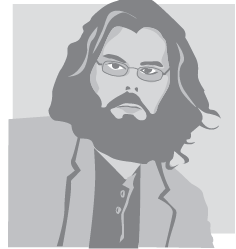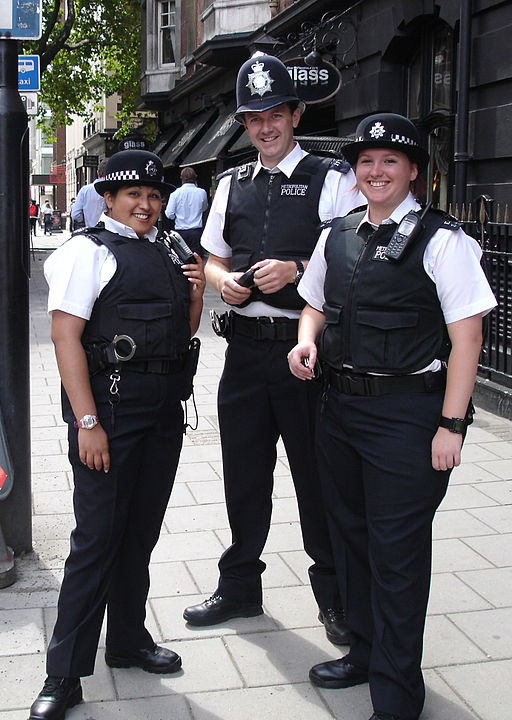aNewDomain — In the United States, we are expected to have unconditional respect for police. Implicit trust and zero criticism.
Even filming police at their work can have consequences and Texas is drafting laws that would make this more difficult. Ransay Orta (the fellow who filmed Eric Garner’s death) is in jail on unrelated charges, which is difficult not to see as retribution and a very clear statement on the part of law enforcement.

These are the same police, after all, who turned their backs on Mayor DeBlasio for saying some really obvious stuff about the way police interact with people of color.
I’m not saying cops are racist. I’m saying cops are Americans. And Americans are racist.
But beyond that, everyone from Michelle Alexander to Vice are trying to clue us in to the fact that our police have become seriously militarized in the wake of waves of military actions in the Middle East.
Starting in the Reagan administration, the “War on Drugs” became a means for local departments to obtain military-grade hardware and increased funding.
Definite quid pro quo is at work here, too, with politicians being able to tout drug-enforcement numbers and earn re-election.
In the midst of all this, is it wrong to ask what police are for?
So what are police for?
If you’re in the middle class and white, you probably know police mostly as the folks who pull you over for speeding.
Fines for traffic violations don’t really change driving behavior, but they do produce revenue. It doesn’t appear most big departments exploit motorists for the majority of their funding but this remains an important revenue stream. For small towns, it can be much more vital.
If we really wanted to change driving behavior, we would use empirically verified methods to do so. Psychological research shows punishment is not effective for changing behavior. But reinforcement is.
Be honest: You don’t drive the speed limit, but you do apply the brakes when you see a black-and-white.
What if they paid you to drive the speed limit?
What if the police used traffic cameras to observe when people were obeying speed limits, coming to a complete stop at stop signs and so on — and sent small amounts of money in the mail to those identified drivers?
Allstate does it. Go a specified period of time without a ticket or accident, get a check in the mail. That’s because Allstate has a vested interest in you driving safely: they pay out fewer claims. The police have no interest in you driving safely. If everyone drove safely, within the established limits, an important revenue stream would dry up.
So is this what police are for? To fund themselves using ineffective behavior modification strategies so they can afford the personnel and equipment to continue those ineffective strategies?
Or is it law enforcement that is our primary interest?
You can’t spell enforcement without F-O-R-C-E
Interesting word, enforcement. Force is implicit in it.
Through police, politicians lend an aspect of force, coercion, implicit violence to the laws they write. Compliance with the law is not voluntary. It is compulsory, meaning if you fail to comply with particular laws or their agents, someone in a uniform will arrive to compel your compliance.
“Compel” is the root of “compulsory.” “Force” is the root of “enforcement.”
Sometimes this is a force for good. When the National Guard arrives to make sure desegregation happens, for example, we have eliminated the voluntary nature of acceptance for people unable to evolve into an America of equal opportunity.
Armed robbers perhaps require the use of equal, measured, proportional force, and that keeps law-abiding citizens safe.
And our gun-crazy country is very heavily armed.
It seems reasonable that the police are paranoid
The NRA spends an obscene amount of cash keeping a few people ramped up on the issue of guns. It’s a toxic political issue. Locally, we lost two duly-elected politicians to a recall when they voted for some quite mild regulations on guns, like limiting clips to 15 rounds each.
Most people don’t care particularly about issues around firearms, but the few who do wield disproportionate political power (and account for most of the gun sales).
With all that firepower out there, legal or illegal (and too many regulations on guns seem to create a black market just the same way prohibition created Al Capone), it seems reasonable for police to ask for protection, and to be a little paranoid.
But do cops need tanks?
So do we need tanks, military-grade weaponry, riot gear and tactics?
Some laws might need some force behind them. But do SWAT teams need to show up to serve routine warrants on non-violent offenders?
Most pernicious of all is the uneven application of justice. The justice department’s investigation into the activities of the Ferguson police force found a consistent pattern of exploitation of the poor and especially the colored people of Ferguson, for the purposes of propping up the economically troubled city government.
The idea that this is an isolated case in our very large, economically troubled country seems absurd — like the idea that intelligent life resides only on Planet Earth.
Take Kansas. Applying discredited conservative economic principles — trying to attract more money to the state by reducing taxes on businesses and all but eliminating them on wealthy people, relying instead on taxes only on the poor — has resulted in a budget disaster in that state. Rather than bring back any taxes, though, the state government is doubling down on these policies.
Is Chris Rock just a terrible driver?
Might the police in Kansas be assigned to do a little fundraising on the backs of poor people, making up budget shortfalls through some tickets and fines? Would we be surprised if this happened? There are already some comically transparent attempts to blame the poor through bills to limit how poor folk can spend their food assistance money.
So Chris Rock gets pulled over a lot. Maybe he’s just a terrible driver, but I don’t think so.
Racial profiling is a fact of life for police and citizens, from stop-and-frisk in NYC, to a problem on Connecticut’s turnpikes, to Ferguson, to Chris Rock.
Is this what police are for? To single out people of color for harassment, fishing expeditions, differential justice?
Are police for protecting monopolies?
It is legal to sell beer and cigarettes. In most parts of the country, it is illegal to sell or own marijuana.
There is really no moral difference between these compounds. But there is a legal one. Police can take you into custody for having pot, heroin, cocaine, LSD, or really any bag of white powder on your person. They can impound your property or money on the mere suspicion that it was involved in a crime involving drugs or even the unfounded allegation.
Property has no civil rights; it is guilty until proven innocent.
Here again, the poor wind up being targeted through civil forfeiture to fund police departments and prop up underfunded governments.
The abuses of this law are well-founded at this time.
So is this what police are for? To make sure legal drugs don’t have competition from illegal ones, and once again to provide a revenue stream?
Are police for keeping for-profit prisons full of customers?
Selling kids to prisons — and for a profit
D.L.Hughley did a better job investigating this issue than I ever could.
We also have at least one case of racketeering, with a judge essentially selling kids to prisons for profit.
Is this what police are for? To pull kids out of school for minor infractions of school policy and get them into the pipeline — the school-to-prison pipeline?
How about to evict people from their homes?
When a home is foreclosed, police can show up, with the implicit or explicit threat of violent coercion, to remove people from their homes.
Are the police for adding force to the list of power that rich people (or bank, corporations, or other entities) have over poor people? If you think I am exaggerating, think about what happens to peaceful protesters who get in the way of business. Police brutality allegations exist from Ferguson to Wall Street.
Is this what police are for? To protect white supremacy, to keep some drugs more profitable than others, to exploit poor people for profits, to enforce the power of rich folks over poor? To break up legal, peaceful public protest, making sure the rich right to free speech trumps the poor constitutionally guaranteed right to peaceful assembly?”
Do we have to talk about the vast majority of police activity being useful, peaceful, laudable work on our behalf?
Most police interventions probably are helpful and a large proportion are medical interventions.
I don’t hate cops. I know police officers are people with a dangerous job, any number of dangerous jobs, often motivated to serve and protect. And I want my son to know when he’s lost or in trouble he can find an officer and get help.
So is that what police are for? To be helpful to citizens?
My friend on the highway patrol once complained that her job was little more than tax-funded AAA. But what is wrong with that?
Don’t police also help lost people get home? Check up on our welfare? Make sure people get a tow when they need it? Protect the weak from the strong? Help keep the peace when it needs to be kept? Even catch the bad guys so they can face justice?
The fact that we need police and that cops do good for us, that they are often or even usually good people, should not keep us from attending to the uses of police that are political, racially motivated, exploitive, unconstitutional and sometimes criminal.
When we are no longer allowed to criticize — or even monitor and keep accountable! — our police forces, we have lost a fundamental civil right. And we have lost more than that. We have lost our safety.
For aNewDomain, I’m Jason Dias.
Image of friendly MP officers in London: Octagon (Own work) [Public domain], via Wikimedia Commons













